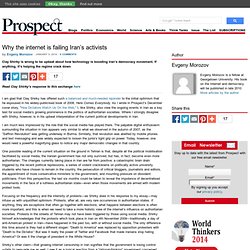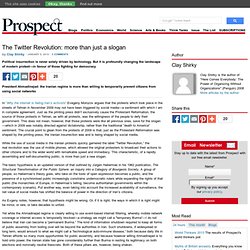

The net advantage – Prospect Magazine « Prospect Magazine. Media guru Clay Shirky responds to criticisms in Evgeny Morozov’s December cover story on why dictators benefit from the web.

Despite pitfalls, he says, the internet remains a positive force for democracy Now online: listen to a joint Demos/Prospect podcast, with Prospect’s Tom Chatfield interviewing Evgeny Morozov about the relationship between the internet and politics, by clicking here. Read Evgeny Morozov’s response to Clay Shirky’s essay here In Prospect’s December cover story, “How dictators watch us on the web”, Evgeny Morozov criticises my views on the impact of social media on political unrest. Indeed, he even says I am “the man most responsible for the intellectual confusion over the political role of the internet.” Though germane, this argument says little to nothing about the tempo, mode, or ultimate shape such a transformation will take. But both these examples took place prior to the invention of the internet and widespread use of mobile phones. Why the internet is failing Iran’s activists – Prospect Magazine.
Clay Shirky is wrong to be upbeat about how technology is boosting Iran’s democracy movement.

If anything, it’s helping the regime crack down Read Clay Shirky’s response to this exchange here I am glad that Clay Shirky has offered such a balanced and much-needed rejoinder to the initial optimism that he espoused in his widely-publicised book of 2008, Here Comes Everybody. As I wrote in Prospect’s December cover story, “How Dictators Watch Us On the Web,” I, like Shirky, also view the ongoing events in Iran as a key test for social media’s growing prominence in the politics of authoritarian societies. Where I strongly disagree with Shirky, however, is in his upbeat interpretation of the current political developments in Iran. I am much less impressed by the role that the social media has played there. Focusing on the frequency and the intensity of protests—as Shirky does in his response to my essay—may infuse us with unjustified optimism.
How dictators watch us on the web – Prospect Magazine « Prospect. The internet is meant to help activists, enable democratic protest and weaken the grip of authoritarian regimes.

But it doesn’t—in fact, the web is a boon for bullies Read more in this debate: media guru, Clay Shirky, responds to Morozov’s criticisms and defends the web as a positive force for democracy. Morozov replies to Shirky here. Hear more: Evgeny Morozov speaks at Demos on the subject: “Is the internet really changing politics?” , and Prospect’s Tom Chatfield interviews Morozov here. My homeland of Belarus is an unlikely place for an internet revolution. Its last presidential election in March 2006 was followed by a short-lived and unsuccessful revolution. Details of this rebellion have since been celebrated by a cadre of mostly western thinkers who believe that digital activism can help to topple authoritarian regimes. Enthusiasm for the idea of digital revolution abounds. At the hearing, I was the lonely voice of dissent in a sea of optimism.
But the truth is often different. The Twitter Revolution: more than just a slogan – Prospect Magaz. Political insurrection is never solely driven by technology.

But it is profoundly changing the landscape of modern protest—in favour of those fighting for democracy President Ahmadinejad: the Iranian regime is more than willing to temporarily prevent citizens from using social networks In “Why the internet is failing Iran’s activists” Evegeny Morozov argues that the protests which took place in the streets of Tehran in November 2009 may not have been triggered by social media—a sentiment with which I am in complete agreement. Just as the printing press didn’t exclusively cause the Protestant Reformation, the source of those protests in Tehran, as with all protests, was the willingness of the people to defy their government. This does not mean, however, that those protests were like all previous ones, save for the slogan—which in 2009 was notably directed against dictatorship, rather than the traditional “death to America” sentiment.